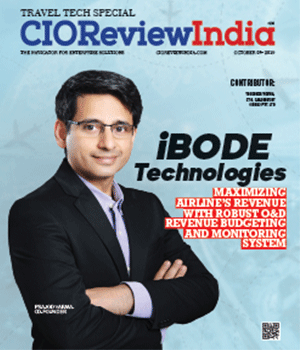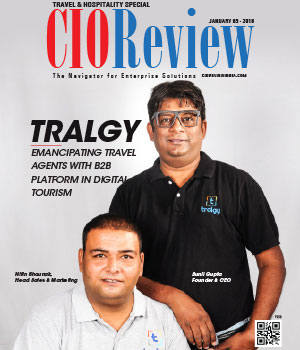
Need For A More Customer Centric Business Approach In Travel Industry
Yogender Verma, CTO, Carzonrent (India) Pvt. Ltd
 Everything technology touches is bound to change radically. Travel and tourism is one such industry that is fostering significant changes in regards to the experience travel companies offer to their customers today. Companies have never been more aware of the fact that the traditional ways of interacting with the customers won’t make the cut and thus, are ready to integrate newer and engaging solutions to their existing business strategies. Brands are continuously on the lookout for innovative and tech-pivoted solutions to better their operational efficiencies and meet customer expectations.
Everything technology touches is bound to change radically. Travel and tourism is one such industry that is fostering significant changes in regards to the experience travel companies offer to their customers today. Companies have never been more aware of the fact that the traditional ways of interacting with the customers won’t make the cut and thus, are ready to integrate newer and engaging solutions to their existing business strategies. Brands are continuously on the lookout for innovative and tech-pivoted solutions to better their operational efficiencies and meet customer expectations.
The Name of the Game is Experience
Over the years, travel has morphed by leaps and bounds, and so have the travellers. What travellers long for is a different experience. For a customer, a great travel experience is mainly driven by three primary factors – Immediacy in response, smooth interaction and personalised content. The good news is that brands understand what customers expect during the travel booking journey. They are aware that the offerings that pleased travellers 10 years ago, no longer work in the present day scenario.
For travel and tourism brands, especially, providing a great experience starts long before the customer even begins the trip. Researching and planning for a trip is where it all starts. So, the experience has to be a superb one right from the beginning. As technological innovation continues to shape the travel industry, businesses have a huge opportunity to flex their creativity, get the online and offline channels in sync and deliver a better experience to their customers.
“Another major advantage of blockchain technology is its decentralised nature that ensures the transactions are always traceable and never lost”
Smartphones, artificial intelligence (AI), electronic payments, facial recognition, chatbots and so on, have improved the whole travel experience – right from planning to booking till the end of the trip – in incalculable ways. However, brands want to scale up their game a notch higher and deliver exceptional solutions to the customer’s expectations. As a result, the demand for next-gen digital technologies in the travel sector has risen considerably in the last few years. Here are the technology trends which needs to be watched out for in 2019 to stand out and beat the high level of competition in the travel industry:
Technovations 2019: The Movers and Shapers of Travel Industry
1. Internet of Things (IoT)
One of the biggest disruptions that is expected to revolutionize the travel industry is the Internet of Things (IoT). This technology provides internet-based interconnectivity between everyday devices, thereby allowing a smooth exchange of data. With the competition rising among the travel and hospitality brands to stand out with respect to meeting the demand for better service, the adoption of IoT is gradually witnessing an upswing.
Use of IoT technology in hotel rooms to enable guests to personalise their stay as per their needs, affixing RFID tags or sensors to the luggage at the airport for locating the luggage digitally, embedding sensors in the seats inside the aircraft to keep a track of a passenger’s health, sending electronic key cards to hotel guests on their phones and providing real-time information to the travellers depending on their location right on their smart connected devices are some of the examples of how IoT can benefit the travel industry.
2. Recognition Technology
Until recently, facial recognition technology was a concept associated mainly to sci-fi movies. However, today facial recognition is being introduced more frequently in the travel industry since tourism companies have to deal with a large number of travellers. This technology is a form of biometric artificial intelligence, which can verify a person’s identity based on their facial features and skin textures.
One of the most obvious ways in which facial recognition technology can be of benefit to the travel industry is through increased security at the airports, easy check-ins at the hotels and quick and seamless payment authorisation at the time of checkouts.
3. Augmented Reality & Virtual Reality
Both, virtual and augmented reality are emerging as disruptive technologies in the travel and hospitality industry. Some of the ways businesses and marketers are bringing these technologies into the mainstream are - Virtual tour of hotels and flights before making the purchase, personalised services to make them more immersive and helpful for consumers, serve as an efficient sales tool to showcase premium services to customers and encourage them to upgrade, and provide a virtual view of the cities which travellers might not have even considered visiting.
4. Robotics
Moving a step further ahead of the chatbots are the actual robots that can help improve customer interactions to a large extent. The hospitality industry is the best ground for robotics application. While many hotels worldwide have already started using robots for various purposes - greeting visitors, helping with check-in and checkout procedures, showing the guests around, delivering luggage to the rooms and providing information – this technology is still in the infancy stage in many countries.
5. Artificial Intelligence (AI)
Until a few years ago, an online presence was the primary channel to reach customers. Then came the era of mobile-first approach in a bid to be everywhere and all the time. And, now we are on the edge of entering the next era – Artificial Intelligence (AI). Brands are banking on AI to predict travel choices, personalize services and efficiently manage pre and post-trip needs. Key areas where artificial intelligence can strongly impact travel to provide better assistance and improve customer experience are voice-based assistance for digital interactions, recommendation systems enable by AI and dynamic pricing technology that can help brands synchronize their pricing strategies in real time as per the traveller’s purchase patterns.
6. Big Data
Almost every industry today relies on data to plan their business strategies and gain an edge over their peers. Big data analytics is benefitting the travel industry in a huge way. With the help of Big Data, travel brands can easily track their customer preferences of travel destinations, give them suggestions and develop personalized packages for them. Another major advantage of big data analytics for the travel industry is that it can help businesses in developing smart-pricing policies by studying rival data like trends in the market, competitors offering, etc.
This list would be incomplete without mentioning of Blockchain Technology since financial transactions are a vital part of the travel industry. Though this groundbreaking tech trend is still a vague concept to many in the business, it withholds a great potential to transform the travel industry. The essence of this technology lies in securing customer data, enhancing transparency and improving transaction reliability. It’s especially vital for the travel and tourism industry as it relies on data transfer between multiple channels namely travel agencies, airlines and hotels. Another major advantage of blockchain technology is its decentralised nature that ensures the transactions are always traceable and never lost.
Travel 2020
As per industry experts, digital travel sales are bound to grow manifold by 2020. In order to keep up with the pace at which the travel and tourism industry is growing, it is quintessential for brands to adopt these trends, and develop their own strategy to fuel up their business growth and offer unique experiences to today’s technologically-sound traveller.
CIO Viewpoint
Why Foolproof Facial Recognition Is Key Against...
By Joseph Sudheer Thumma, Global CEO & MD, Magellanic Cloud
National Technology Day 2025: Powering Progress...
By CIOTech Outlook Team
Aligning IT Roadmap with Business Objectives: A...
By Subhash singh Punjabi, CISO & Head Enterprise Architecture, Deepak Fertilisers & Petrochemicals Corporation Ltd
CXO Insights
COVID Crisis for Hotels: How to Plan Forward
By Siddharth Goenka, MD Octave Hotels & Founder, Aiosell Technologies
Data And Automation In The Hotel Industry
By Jason Michael Fawaz, Vice President of Revenue at Hawkeye Hotels
Key Trends Shaping Travel Tech In 2019




.jpg)
.jpg)
.jpg)



